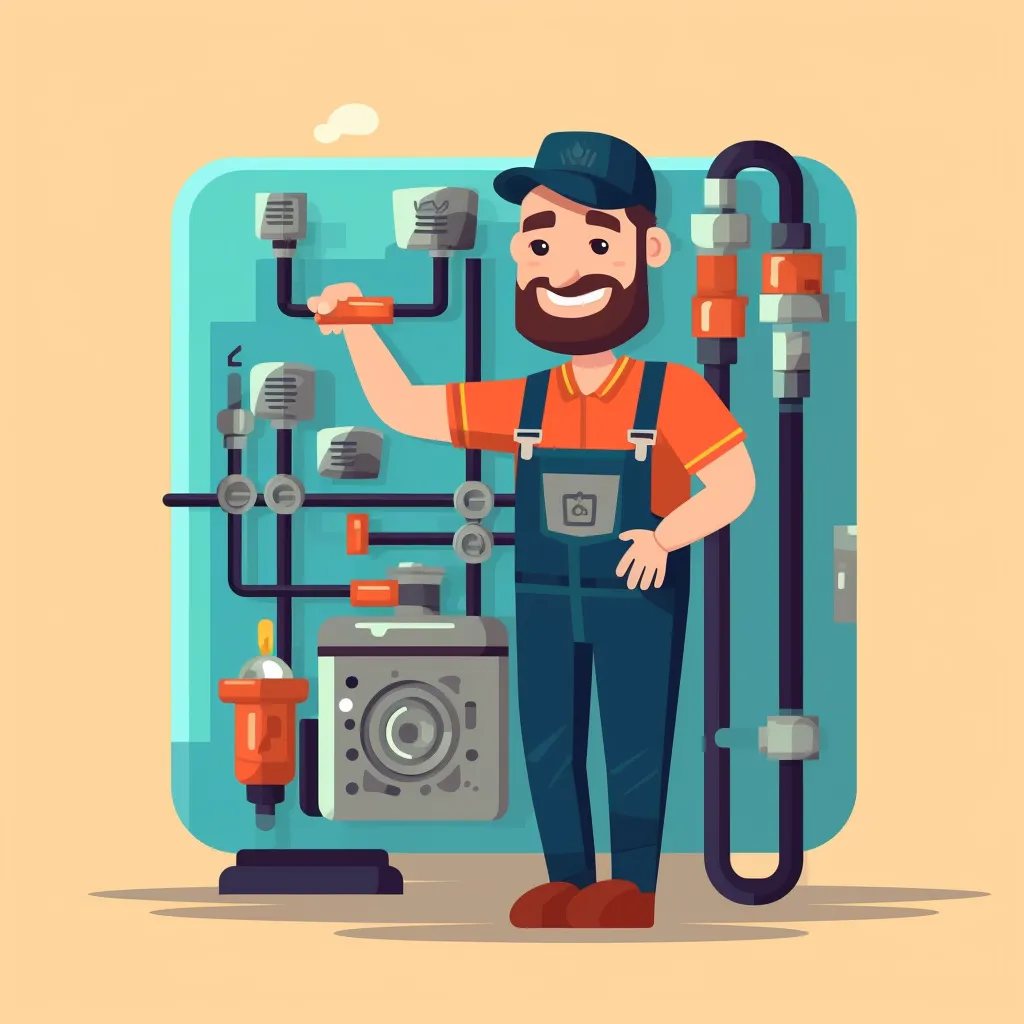Troubleshooting tips for Common San Mateo Water Heater Problems
Maintaining a smoothly running household is essential, and a central part of that is the water heater. It plays a vital role in our daily routines, and a sudden breakdown can be both inconvenient and chilly. This troubleshooting guide aims to help you tackle common water heater issues, ensuring it continues to function reliably. By promptly addressing these problems, you can avoid any disruptions to your daily routine and enjoy a consistently hot water supply.

The tank is leaking
If you notice a leak in your water heater, it could be a result of a faulty pressure relief valve or a corroded tank. Here are the steps you can take to address the issue:
Turn Off the Power: For electric water heaters, switch off the power at the circuit breaker. For gas water heaters, turn off the gas supply.
Shut Off the Water Supply: Locate the cold water supply valve connected to the water heater and turn it off to stop water flow.
Drain the Tank: Connect a hose to the drain valve at the bottom of the water heater and direct it to a suitable drainage area. Open the valve to drain the tank and reduce water pressure.
Check the Pressure Relief Valve: Inspect the pressure relief valve for any signs of leakage or malfunction. If it's faulty, consider replacing it with a new valve.
Examine the Tank: Look for signs of corrosion or damage on the water heater tank. If the tank is corroded and causing the leak, it may be time to consider replacing the entire unit.
Tighten Fittings: Ensure all fittings and connections on the water heater are properly tightened to prevent any leaks.
Professional Inspection: If you are unable to identify the source of the leak or if the issue persists after attempting these steps, it's best to seek assistance from a licensed plumber. A professional inspection can help identify the root cause of the leak and provide the most appropriate solution.

The water is discolored
Discolored water from your water heater may indeed indicate the need for flushing and descaling. Over time, sediment and minerals can accumulate in the water heater tank, leading to discoloration of the water and reduced efficiency.
Verify the Pressure Relief Valve: Check the pressure relief valve for any signs of leakage or malfunction. If it's faulty, consider replacing it with a new valve. If you're unsure, consult a professional plumber for assistance.
Flush the Water Heater: Use a mixture of white vinegar and water to flush the water heater. This can help remove sediment and mineral buildup, improving its performance and water quality.
Examine the Anode Rod: Inspect the anode rod for signs of deterioration or corrosion. If corrosion is present, consider replacing the anode rod to prevent further damage to the water heater.
Professional Descaling Treatment: If the discolored water issue persists, it may be necessary to contact an expert to perform a thorough descaling treatment. A professional can use specialized equipment and solutions to remove stubborn mineral deposits from the water heater.

The water smells bad
When dealing with tank problems in your water heater caused by bacteria buildup, take the following steps:
Flushing the Tank: Regularly flush the water heater tank to remove accumulated sediment and bacteria. Follow the manufacturer's guidelines for safe and effective flushing.
Clean the Tank: If possible, clean the water heater tank using a hydrogen peroxide solution. Mix equal parts of hydrogen peroxide and water and pour it into the tank. Let it sit for a few hours before flushing the tank thoroughly.
Anode Rod Inspection: Check the anode rod for signs of corrosion. If the anode rod is severely corroded, consider replacing it as corroded rods can exacerbate bacterial growth.
Consult a Professional: If the issue persists or if you're unsure how to proceed, consult a professional plumber. They can assess the situation, provide expert advice, and perform any necessary maintenance or repairs.

Noisy water heater
If you're hearing unusual noises from your water heater, such as popping, banging, or rumbling sounds, it may be caused by sediment buildup or loose parts. Here's how to address these issues:
Tighten Loose Parts: Unsecured components or loose fittings can also cause rattling or banging noises. Check all the connections on the water heater and ensure they are properly tightened.
Professional Inspection: If the unusual noises persist or if you're unsure of the cause, consider contacting a professional plumber. They can conduct a thorough inspection, identify the source of the noises, and perform any necessary repairs.


Tank takes a long time to reheat
If your tank water heater is taking an excessive amount of time to reheat, it can be frustrating and inconvenient. Several factors could be causing this issue, such as a malfunctioning thermostat, an undersized tank, or mineral buildup. Here are steps you can take to address the problem:
Check Thermostat: Adjust it to the correct temperature or replace if malfunctioning.
Verify Tank Size: Ensure it meets your household's hot water demands; consider upgrading if needed.
Flush Tank: Remove sediment and mineral buildup to improve efficiency.
Insulate Hot Water Pipes: Reduce heat loss during transportation.
Professional Inspection: Seek assistance for a comprehensive assessment and appropriate solution
Low hot water pressure
If you're facing low hot water pressure, it can be inconvenient and disruptive to your daily routines. The issue could be caused by a small hot water tank or a leaky plumbing system. Here are some steps you can take to resolve the problem:

Check for leaks in the plumbing system and repair if found.
Flush hot water lines to remove sediment and mineral buildup.
Consider adjusting the pressure regulator if present.
Verify water heater size to meet household demands.
Seek professional help if the issue persists or for expert assessment.


Low supply of hot water
If you're experiencing a low supply of hot water that cools down quickly, several factors could be contributing to the problem, including a malfunctioning thermostat, an undersized tank, or clogged pipes. Here are some troubleshooting tips to address the issue:
Check thermostat settings and adjust if needed.
Flush hot water lines to remove sediment.
Consider upgrading to a larger tank or tankless water heater.
Inspect heating element (for electric heaters) for damage.
Check for leaks in the plumbing system.
Insulate hot water pipes to prevent heat loss.
Seek professional help if the issue persists or for expert assessment.
Ways to prevent future water heater problems
To prevent future issues with your water heater, you should:

Periodically inspect for wear and corrosion.
Regularly flush the tank to remove sediment buildup.
Check valves and fittings for leaks.
Replace the anode rod every few years to prevent corrosion.
Schedule professional descaling or annual servicing.
Choose the right water heater size for your needs.
Adjust the temperature to recommended settings.
Insulate pipes to minimize heat loss.
Consider energy-efficient models to reduce energy consumption.
Promptly repair any leaks.
Familiarize yourself with the shutoff valve's location.

While contacting a professional is advisable for uncertain repair or maintenance tasks, following these basic steps can help maintain your water heater and prevent potential issues.
Know when to call
in a licensed plumber
Regular maintenance and timely repairs can extend the lifespan of your water heater, provide reliable hot water, and save you from costly problems down the road. Remember, when in doubt, don't hesitate to reach out to a licensed plumber who can provide expert guidance and support.
What to look for in a licensed plumber
When choosing a licensed plumber, conducting thorough research and considering the following factors is essential:

Insurance and Bonding: Verify that the plumber has proper insurance and bonding to protect you in case of any accidental damages or injuries during the service.
Pricing and Estimates: Obtain detailed quotes and estimates from multiple plumbers. Compare the pricing, but remember that the cheapest option may not always be the best. Look for transparent pricing and a breakdown of costs.
Warranty and Guarantees: Inquire about the warranty on their workmanship and the warranty coverage on any products they use for the water heater replacement.
Response Time and Availability: Consider the plumber's availability and response time in case of emergencies. A reliable plumber should be reachable and able to address urgent issues promptly.
Professionalism and Communication: Choose a plumber who communicates clearly and professionally. They should be able to explain the problem, the proposed solution, and any associated costs in a way that you can easily understand.
Reach out to an experienced professional
Water heater issues can have multiple root causes, and having a licensed plumber inspect the unit is the best way to ensure a reliable and lasting solution. Following the provided suggestions can help troubleshoot common problems, but professional expertise is invaluable in diagnosing and resolving complex issues. Contacting an experienced plumber will ensure that your water heater operates efficiently, providing hot water reliably and avoiding any disruptions in your daily routine. They can provide expert advice, perform necessary repairs, and recommend suitable upgrades or replacements when needed. Don't hesitate to seek professional assistance for a hassle-free and effective resolution to your water heater difficulties.
Contact Us
GET IN FULL TOUCH
PHONE: (650) 337-0872
EMAIL:
ifran@waterheatersinsanmateo.com
All Pro Plumbing and Rooter
San Mateo, CA 94401

